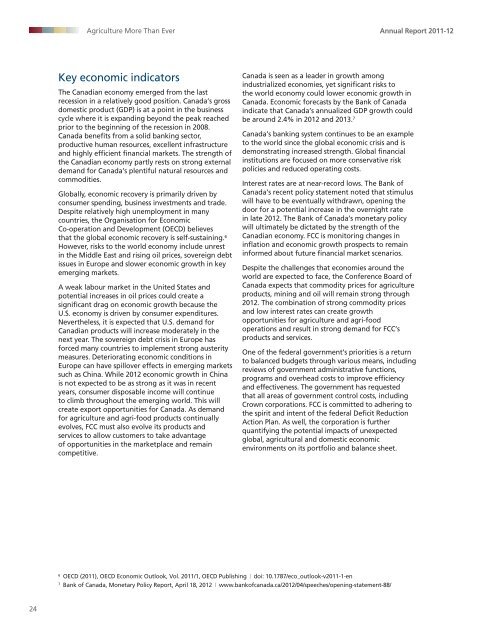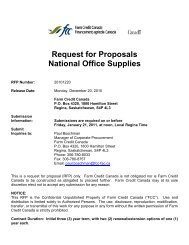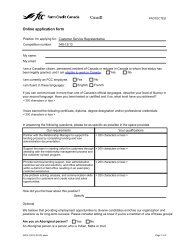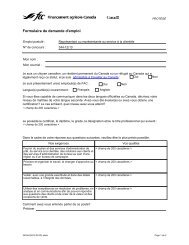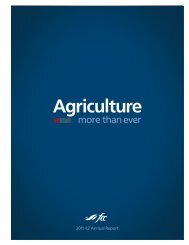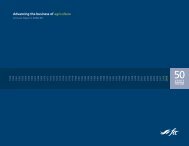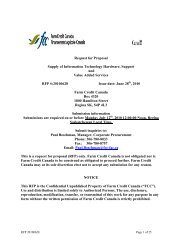Management's discussion and analysis - FCC-FAC
Management's discussion and analysis - FCC-FAC
Management's discussion and analysis - FCC-FAC
Create successful ePaper yourself
Turn your PDF publications into a flip-book with our unique Google optimized e-Paper software.
24<br />
Agriculture More Than Ever Annual Report 2011-12<br />
Key economic indicators<br />
The Canadian economy emerged from the last<br />
recession in a relatively good position. Canada’s gross<br />
domestic product (GDP) is at a point in the business<br />
cycle where it is exp<strong>and</strong>ing beyond the peak reached<br />
prior to the beginning of the recession in 2008.<br />
Canada benefits from a solid banking sector,<br />
productive human resources, excellent infrastructure<br />
<strong>and</strong> highly efficient financial markets. The strength of<br />
the Canadian economy partly rests on strong external<br />
dem<strong>and</strong> for Canada’s plentiful natural resources <strong>and</strong><br />
commodities.<br />
Globally, economic recovery is primarily driven by<br />
consumer spending, business investments <strong>and</strong> trade.<br />
Despite relatively high unemployment in many<br />
countries, the Organisation for Economic<br />
Co-operation <strong>and</strong> Development (OECD) believes<br />
that the global economic recovery is self-sustaining. 6<br />
However, risks to the world economy include unrest<br />
in the Middle East <strong>and</strong> rising oil prices, sovereign debt<br />
issues in Europe <strong>and</strong> slower economic growth in key<br />
emerging markets.<br />
A weak labour market in the United States <strong>and</strong><br />
potential increases in oil prices could create a<br />
significant drag on economic growth because the<br />
U.S. economy is driven by consumer expenditures.<br />
Nevertheless, it is expected that U.S. dem<strong>and</strong> for<br />
Canadian products will increase moderately in the<br />
next year. The sovereign debt crisis in Europe has<br />
forced many countries to implement strong austerity<br />
measures. Deteriorating economic conditions in<br />
Europe can have spillover effects in emerging markets<br />
such as China. While 2012 economic growth in China<br />
is not expected to be as strong as it was in recent<br />
years, consumer disposable income will continue<br />
to climb throughout the emerging world. This will<br />
create export opportunities for Canada. As dem<strong>and</strong><br />
for agriculture <strong>and</strong> agri-food products continually<br />
evolves, <strong>FCC</strong> must also evolve its products <strong>and</strong><br />
services to allow customers to take advantage<br />
of opportunities in the marketplace <strong>and</strong> remain<br />
competitive.<br />
Canada is seen as a leader in growth among<br />
industrialized economies, yet significant risks to<br />
the world economy could lower economic growth in<br />
Canada. Economic forecasts by the Bank of Canada<br />
indicate that Canada’s annualized GDP growth could<br />
be around 2.4% in 2012 <strong>and</strong> 2013. 7<br />
Canada’s banking system continues to be an example<br />
to the world since the global economic crisis <strong>and</strong> is<br />
demonstrating increased strength. Global financial<br />
institutions are focused on more conservative risk<br />
policies <strong>and</strong> reduced operating costs.<br />
Interest rates are at near-record lows. The Bank of<br />
Canada’s recent policy statement noted that stimulus<br />
will have to be eventually withdrawn, opening the<br />
door for a potential increase in the overnight rate<br />
in late 2012. The Bank of Canada’s monetary policy<br />
will ultimately be dictated by the strength of the<br />
Canadian economy. <strong>FCC</strong> is monitoring changes in<br />
inflation <strong>and</strong> economic growth prospects to remain<br />
informed about future financial market scenarios.<br />
Despite the challenges that economies around the<br />
world are expected to face, the Conference Board of<br />
Canada expects that commodity prices for agriculture<br />
products, mining <strong>and</strong> oil will remain strong through<br />
2012. The combination of strong commodity prices<br />
<strong>and</strong> low interest rates can create growth<br />
opportunities for agriculture <strong>and</strong> agri-food<br />
operations <strong>and</strong> result in strong dem<strong>and</strong> for <strong>FCC</strong>’s<br />
products <strong>and</strong> services.<br />
One of the federal government’s priorities is a return<br />
to balanced budgets through various means, including<br />
reviews of government administrative functions,<br />
programs <strong>and</strong> overhead costs to improve efficiency<br />
<strong>and</strong> effectiveness. The government has requested<br />
that all areas of government control costs, including<br />
Crown corporations. <strong>FCC</strong> is committed to adhering to<br />
the spirit <strong>and</strong> intent of the federal Deficit Reduction<br />
Action Plan. As well, the corporation is further<br />
quantifying the potential impacts of unexpected<br />
global, agricultural <strong>and</strong> domestic economic<br />
environments on its portfolio <strong>and</strong> balance sheet.<br />
6 OECD (2011), OECD Economic Outlook, Vol. 2011/1, OECD Publishing | doi: 10.1787/eco_outlook-v2011-1-en<br />
7 Bank of Canada, Monetary Policy Report, April 18, 2012 | www.bankofcanada.ca/2012/04/speeches/opening-statement-88/


